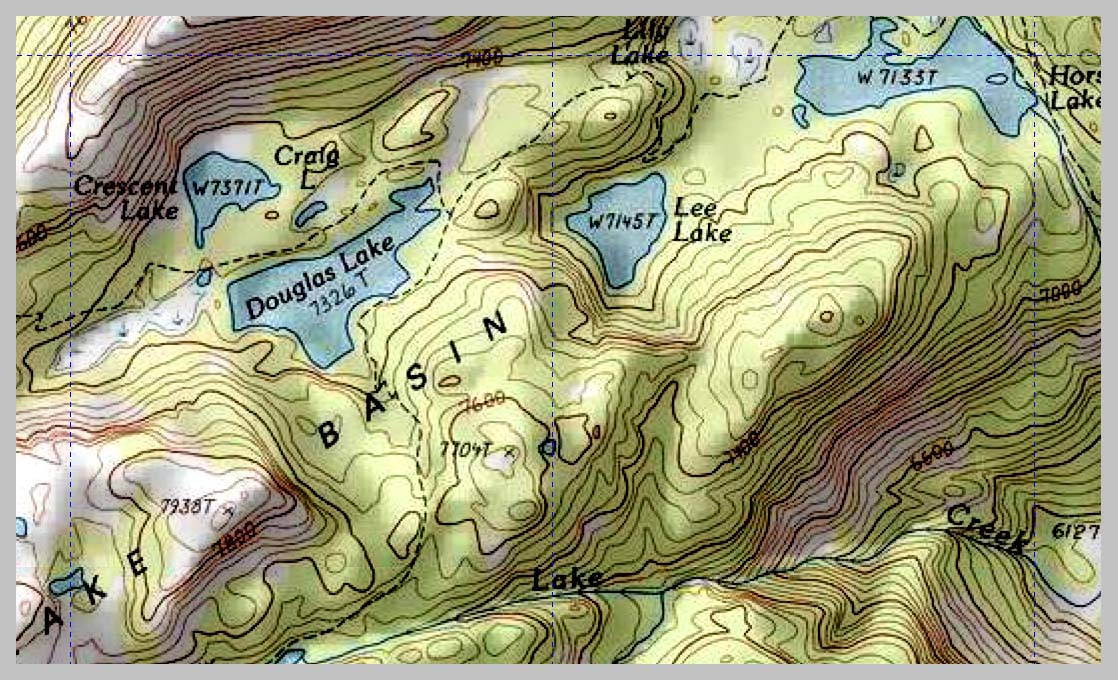

TOPO: DOUGLAS LAKE, named for ("Wild Bill") William O. Douglas,
EAGLE CAP WILDERNESS [ click photo for next . . . ]


TOPO: DOUGLAS LAKE, named for ("Wild Bill") William O. Douglas,
EAGLE CAP WILDERNESS [ click photo for next . . . ]
Here's a fine, short, documentary tribute to Justice Douglas. He looks back,
in his own words, on the philosophical background of his 36-year tenure
on the U.S. Supreme Court. Just as I've always said that I never trust
composers who do not conduct their own music, I also never trust
politicians or appointed officials without a sense of Earth, or a deep love
of place. "Wild Bill" Douglas is a man I would trust.
....Something to meditate upon, I think, as we trek up to the beautiful lake
which proudly bears his name...
On the road in the American Northwest.
THE EXPANDING CIRCLE OF
ETHICAL AWARENESS
“The land ethic simply enlarges the boundaries of the community to
include soils, waters, plants and animals,
or collectively: the land.”
Aldo Leopold
"The critical question of "standing" would be simplified and also
put neatly in focus if we fashioned a federal rule that allowed
environmental issues to be litigated before federal agencies
or federal courts in the name of the inanimate object about
to be despoiled, defaced, or invaded by roads and bulldozers
and where injury is the subject of public outrage."
Justice William O. Douglas
"Trees have standing," from the dissenting opinion
in the landmark environmental law case,
Sierra Club v. Morton (1972)
A key challenge of the current era, it seems to me, is the need to
awaken a new sense of ethical responsibility. And a key challenge of
this new ethics is to develop a sense of responsibility strong enough
to counterbalance our, in historical terms, newly-found and massive
destructive powers. The image that presents itself is simple. It is the
image of an expanding circle of awareness, one which grows to em-
brace the whole of the living Earth.
This image of the Earth as seen from the surface of the Moon—cer-
tainly one of the great leaps in creative awareness since the discovery
the Earth was not flat but round—has already deeply and irreversibly
transformed the consciousness of humanity. At the same time, few
of its implications have been realized. And many of the outmoded
straight-line, flat-earth habits of seeing, thinking and acting are still
fully active and dominant.
Chief among these old habits of thought are the concepts of war and
waste. They are old, because they are not in harmony with the new
reality of one world and one humanity; And they are habitual, because
they lead us to repeat the same mistakes over and over again.
Underlying these old habits of thought is the tacit metaphysics of
167
fragmentation, with its complementary illusions of separation and
independence. Separation assumes that the consequences of my actions,
or the actions of the group with which I identify, do not extend much
beyond the physical boundaries I can see with my own eyes. And, in a
related way, independence assumes that what happens beyond the very
limited circle of my, or my own group’s, visual circumspection is not
relevant, does not touch or affect me personally. It is easy to see from a
wider, perhaps what we might call, philosophical perspective, that both
assumptions are patently false. At the same time, it is crucial to real-
ize that this was not the case as recently as just two hundred years ago.
This, I think, is a remarkable fact. Two hundred years ago, a family’s
waste did not venture much beyond their own backyard, but now the
pollutants it generates everyday in amazing quantities routinely resur-
face in some of the most remote corners of the planet. And so it is also
with the consequences of war. Now that the atom has been split—argu-
ably the ultimate phase in self-destructive fragmentation—a handful
of bombs can take down the planet, and the waste of but a few reactors
comes full circle to remain a threat for more generations than we can
honestly think about.
Clearly, a concomitant great leap of ethical creativity is called for if we
are to effectively limit our new-found destructive potential. And equally
clear is that it would be naive to think we could solve problems of a
global scale like Climate Change by not at the same time addressing the
directly related and in my view more fundamental problems of war and
waste. Just the fact that about a third of the Earth’s resources are pres-
ently devoted to either preparing for war or actively waging it, should
demonstrate the necessity of this. Or the parallel fact that present styles
of consumption are so extraordinarily short-sighted that they would
require the resources of two or three Earths merely to sustain into the
near-term future.
So, Aldo Leopold’s expanding circle of awareness of the Land Ethic
must now of necessity be expanded very much further. Every child
can see the truth of the path of renewable energy. And every mother
can see that life on planet Earth is not the straight line to nowhere or
somewhere else of war and waste, but rather eternally and wholly here
and round.
THE LITTLE CLAVIER please preview 150 of 631 pages
w/ my black & white photography [opens in new window]
Follow @cliffcrego
If you're a picture-poems fan, please visit my Living Water
Gallery—the best of my flowform photography w/ a selection
of quality prints & frames . . .
[ mouse over for controls / lower right fro full-screen ]
All Photographs & texts by Cliff Crego © 1998-2015 picture-poems.com
(created: VI.1.2008)